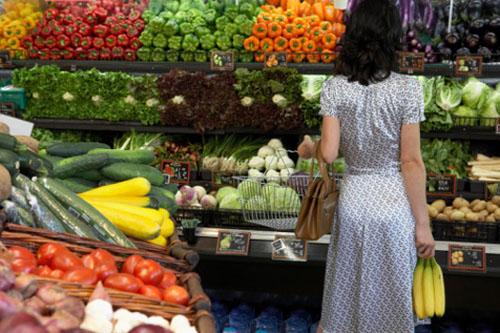S.510 is a danger to food freedom

For a law that is supposed to evoke feelings of safety, Senate Bill 510 – The Food Safety Modernization Act – sure is instilling a lot of fear into the minds of many. Why?
With its companion bill in the House having been passed last June, the Senate's 73-25 vote to move the law forward on Monday rang a death knell for local food economies everywhere. Even kitchen gardeners are worried that the “fake food safety bill” will affect their ability to grow food in their own backyard without government interference.
When the food safety bill was introduced in the House last year, there was an uproar from small farm and local food production advocates who lashed out at the unnecessarily broad language of the bill. In essence, organic farming would have been criminalized and even home pantries would have been subject to government raids if said homes didn't obtain a state permit to store food.
Such concerns were addressed with the introduction of the Manager's Package last summer. This rewording of the bill left it to the FDA's unerring discretion whether or not "raw agricultural commodities that the Secretary has determined are low risk and do not present a risk of serious adverse health consequences or death" would have to comply with “modified regulations” only. I guess we can kiss our raw dairies goodbye. The new version also omitted:
"any requirements that conflict with or duplicate the requirements of the national organic program established under the Organic Foods Production Act of 1990..."
In addition, a set of amendments proposed by Jon Tester and supported by over 128 food organizations passed the Senate. All producers who take in less than $500k a year and farmers who sell directly to consumers would be exempt from most of the onerous compliance standards. Food freedom advocates say this isn't enough, though.
Here are a few reasons to be worried:
Alison Levy in a recent Huffington Post contribution points out:
“With dietary supplements recently outlawed abroad, there is tremendous concern about this bill being a Trojan Horse for a take down of the healthy supplements industry. New language has been added to exempt '...any dietary supplement that is in compliance with the requirements of sections 402(g)(2) and 761 of the Federal Food, Drug and Cosmetic Act (21 USC 242(g)(2), 379aa-1).'" It must be remembered that even this protection is discretionary, at the whim of the FDA Food Czar, a former Monsanto executive. In fact, not much about the law is outside of Monsanto's and Big Ag's discretion through their cronies at the FDA.
And then there is this gem from Levy's write up:
“The organization, Citizens for Health (CFH) also points out disturbing and unacceptable language in the House version of the bill, which 'calls for the effective imposition of martial law through cordoning off potentially affected geographic areas in the case of a perceived food transport safety threat in order to halt the movement of food.'”
Yes, you read that correctly, percieved transport threat.
The seemingly limitless discretionary powers granted to our new Food Czar will more than likely pave the way for Monsanto to gain monopoly power over the entire conventional seed market by his mandating the use of genetically modified organisms. The new law would also allow the FDA (at its own discretion, of course) to require that antibiotics, hormones, pesticides and slaughterhouse wastes be placed in our food supply.
For those of us who've been following CODEX Alimentarius, an orwellian international law enforceable under a binding trade agreement, we foresaw the worst elements of S.510. The most heinous portions of the law were actually drafted by international corporate interests in order to “harmonize” with the Codex treaty. By order of the World Trade Organization, all member states must adhere to a strict Napoleonic code that reclassifies whole foods as toxins, thus placing an upper limit on the quantity of any given nutrient in any given food product traded abroad, while also allowing a slew of real industrial toxins to be present at excessive levels. Moreover, Monsanto's brainchild and now Eli Lilly's bane, the cancer causing recombinant bovine growth hormone (rBGH), can be required for all dairy cows involved in “interstate commerce” (when is someone going to challenge that silly legal interpretation). Protection of GMO crops is central to the treaty.
Feeling safer yet?
On Tuesday, Capitol Hill's newspaper Roll Call announced that S510 could be derailed on (gasp) Constitutional grounds. In a process called “blue slipping” the House can block passage of the bill because the Senate overstepped its legislative bounds. Certain provisions in the Senate bill amount to new taxes and only the House has the authority to originate new taxes. But food freedom advocates aren't relieved. Even if the bill is sidelined until the next Congress is seated, it will have to be passed in one form or another for the sake of our international agreements.
As per the new law, the FDA would come under the auspices of Homeland Security and its budget would increase 40%. Since 2008, the Obama administration has increased the FDA budget by 135% to $4.03 billion. An additional 18,000 government employees will be needed to enforce the multitude of new regulations, a twofold increase in personnel.
Will granting more authority to an agency that inconsistently uses the regulatory tools it already has make us safer? No, of course not. The only thing S.510 will succeed at is driving smaller, safer producers out of business, broken under the weight of oppressive administrative costs and hidden taxes, while not addressing the root of the foodborne illness problem – the subsidization of industrialized (read: unclean) farms and centralized (read: pathogen-rich) food processing centers. Food prices will rise while the food supply, now even more centralized, will become less safe.






